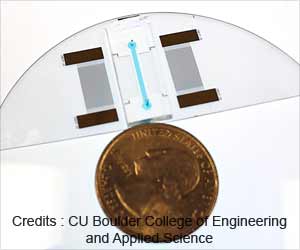Risk factors of acute chest syndrome and effective preventive and therapeutic strategies to prevent recurrent episodes in children with sickle cell disease.
Acute chest syndrome (ACS), a potentially severe lung complication of sickle cell disease, increases a child’s risk of respiratory failure, chronic lung disease, and prolonged hospitalization if not recognized early and treated effectively. Risk factors of ACS and effective preventive and therapeutic strategies to prevent recurrent episodes in children with sickle cell disease are presented in a new article published in
Pediatric Allergy, Immunology, and Pulmonology, a peer-reviewed journal from Mary Ann Liebert, Inc., publishers.
In "Acute Chest Syndrome in Children with Sickle Cell Disease," coauthors Shilpa Jain, Women and Children’s Hospital of Buffalo and Hemophilia Center of Western New York, Buffalo, and Nitya Bakshi and Lakshmanan Krishnamurti, Children’s Healthcare of Atlanta, GA, examine the multiple factors that can contribute to a child’s increased risk of ACS and proposed mechanisms by which ACS may develop. The researchers also provide a comprehensive review of the clinical features of ACS in this patient population, preventive approaches including the use of hydroxyurea, and what is needed to achieve a prompt diagnosis.
Effective therapies, pain control and when to consider the use of bronchodilators are other important topics discussed.
"Management of acute chest syndrome is a major challenge for physicians and other healthcare providers caring for children with sickle cell disease. Not only can episodes recur but damage from repeated episodes can lead to pulmonary infarcts, fibrosis and deterioration in lung function." says Pediatric Allergy, Immunology, and Pulmonology Editor-in-Chief Mary Cataletto, MD, Professor of Clinical Pediatrics, Stony Brook University School of Medicine. "It is not only important to know how to recognize and treat an acute episode but to be able to implement long term management strategies to try and prevent future episodes."
Source-Eurekalert















